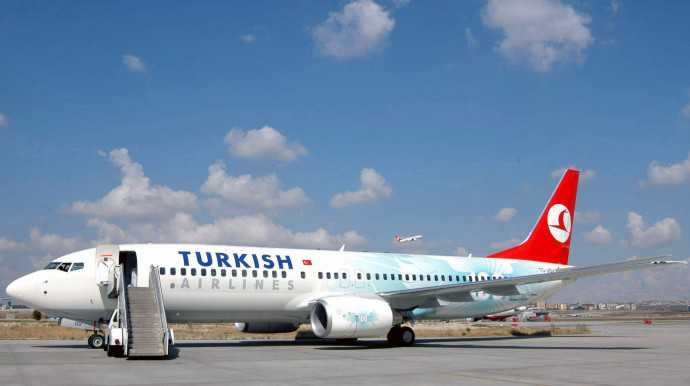 Following the foundation of the State of Israel in 1948, a Cuban airline and a group of Cuban pilots were commissioned to transport all the Jewish people who wished to immigrate to the dawning state. Their many flights between 1951 and 1952 as part of what may be the largest air evacuation in human history had remained unknown until now.
Following the foundation of the State of Israel in 1948, a Cuban airline and a group of Cuban pilots were commissioned to transport all the Jewish people who wished to immigrate to the dawning state. Their many flights between 1951 and 1952 as part of what may be the largest air evacuation in human history had remained unknown until now.
By: Luis Hernández Serrano
Email: [email protected]
They were not diplomats or delegates going to an international convention, nor pilgrims on the search for indulgences or archaeological relics. The group of pilots that departed from Cuba in 1951 to the Holy Land had a different mission.
The event remained unknown for almost 60 years. The Cuban pilots were to take part in the largest mass air evacuation in human history.
Aviation historian Captain Rolando Marron told Juventud Rebelde newspaper the details of their ordeal.
“In 1948,” he began, “the Republic of Israel was founded in a territory that had been part of Palestine and was under British control. The deficient economy of the country demanded arms to harvest the land and brains to administrate the dawning republic.”
“In Europe, as a consequence of the recently concluded world war, there were hundreds of thousands of dispossessed Hebrews eager to move to the new homeland they were being offered. Large groups of immigrants began to arrive in Israel from all over Europe, as it was easier for them to find ways to get there.
“As the relations between Jewish and Arabs became tenser in Arab countries, the Israeli government intervened to facilitate the evacuation of a larger number of Jewish people to their Promised Land.
“Arab governments prohibited Jewish immigrants to travel by road, and the Egyptian blockade of the Suez Canal made it impossible for them to get to Israeli territory by sea.
“The only option left was organizing a mass air evacuation. Negotiations began under acute time constraints. Since Israel had no diplomatic relations with Arab League member states, and planes bearing Israeli flags could not therefore be used for the exodus, they had to hire planes from a neutral country.
“By coincidence, an important official of the Israeli mission in New York was a very good friend of Cuban businessman and civilian pilot Narciso V. Rosello Otero, who was appointed chair of the company created for the plan: Intercontinental Aerea de Cuba S.A
“When the company had secured the required permits in Cuba, its central office opened at 464 Zulueta, in Old Havana, and a branch office was also inaugurated in Nicosia, Cyprus.
The historian said that while the final arrangements were made to the administrative structure of the company, Cuban pilot were hired, in compliance with Cuban laws, to fly the planes.
“The first group was made up of five pilots who were unemployed at the time because the company they worked for, Aerovias Cubanas Internacionales S.A., had gone bankrupt due to the incipient development of domestic commercial flights in Cuba.
The Air Exodus
Historian Marron adds that during the nearly two years that the mission lasted, more than 115,000 refugees were brought from Iraq; 25,000 from Iran, and a few hundred from India and Yemen. The Yemen refugees had to cross the border to reach the English territory of Aden to board the planes.
“Most of the refugees from Iraq boarded at the airport of Baghdad, and the rest in Bahra, near the famed Abadan oil refinery, at the important oil harbour located only a few miles away from the Persian Gulf border.”
The historian noted that it was in Iraq where the Jewish passengers experienced the most difficulties, given the persecutions and dangers they faced in that country, and it was necessary to evacuate them as soon as possible. The abovementioned number of Iraqi refugees was rescued over a period of approximately ten months.
“The Iranian refugees,” continued Marron, “were picked at the Teheran airport. They were not forced to leave the country, and all of them immigrated to Israel voluntarily, with the exception of 1,000 who had escaped from Iraq and Afghanistan through the border, and could not remain in Iran due to immigration regulations.
“The longest flights were to Bombay, in India, where a few hundred decided to immigrate. Many of them would return later to India because they were not able to adapt to the living conditions they found in their new homeland.
“Taking off from the modern Lydda airport in Tel Aviv, the flight had a stopover in Sharjah, at the Royal British Air Force base, in the remote area of Oman Trucial off the coast of the Arabian Peninsula, in the Persian Gulf.
“A typical Arab village by the seaside and the barracks of the English troops were the only signs of life near the airfield in the middle of the dessert. The second part of the trip was the crossing of the Indic Ocean, battered by the dangerous monsoons, and the journey concluded at the Santa Cruz airport in Bombay.
“The hardest and more frequent routes were Lydda-Baghdad and Lydda-Teheran,” said Marron.
A Forced Landing
“Although the first of these routes was relatively easy in the winter,” explained Marron, “flying conditions would drastically change in the summer, when sandstorms considerably reduced visibility in Baghdad, impeding access to the airport. Sometimes pilots had to land in alternate airfields to wait for the weather conditions in their places of destination to change.
“Furthermore, high temperatures affected the performance of plane engines. In Baghdad, it was normal to have temperatures between 45ºC and 50ºC in the shade! And not only at noon, but also in the morning and late afternoon. That is why pilots always tried to take off in the night, in order to gain time.
“Adolfo Diaz Vazquez was the only pilot who had to make a forced landing during the evacuation program. One of the engines of the C-46 he was flying stopped on route between Baghdad and Lydda, at night! Thanks to his vast experience, all the passengers and the plane escaped unharmed. The passengers and the crew were taken to Israel in another plane. Some days later, Eugenio Ramos Escandon flew the plane to Lydda. The aircraft had been repaired by a group of Cuban mechanics under the guidance of Eduardo Segredo Salgado.
“By the end of 1952, the wave of immigration to Israel decreased and some of the planes that had been used for these ends began flying to European cities: Paris, Rome, Amsterdam, Zurich, London, Athens and Geneva.
“In early 1953, the group of Cuban pilots returned to Cuba, after having successfully transported almost 150,000 Jewish immigrants to Israel. The crew of these flights wore an insignia with a Cuban flag on their uniforms.
“The main base of operations of the Intercontinental Aerea de Cuba S.A. Company was always in Cuba, but its planes never flew in the national territory; they never even touched Cuban soil. Part of the money earned in this operation was probably used to bribe the Cuban president at the time, since permits were only granted following a local inspection of the aircrafts.
Pilots who took part in the evacuation program:
Manuel Gonzalez Linares, with more than 6,000 hours of flight.
Eugenio Ramos Escandon, experienced C-46 capatain.
Guillermo Verdaguer Boan, survivor of a plane crash in which one of his comrades lost his life.
Miguel Acosta Rosellp.
Antonio “Nico” Fernandez Martinez
Adolfo Diaz Vazquez, also known as “Lindbergh,” an aerobatics champion. He was the sixth pilot on Narciso Rosello’s payroll.
Eduardo Segredo Salgado, the brilliant mechanic of the team.
The Zionist State of Israel
When the Second World War ended in 1945, Jewish political organizations led by Theodor Herzl pushed for the creation of a state that should have its capital in Jerusalem, Palestine, which was a British protectorate at the time. The plan was to give the Jewish victims of the Nazi genocide a place to start over after the war. It is said that the area was infiltrated by terrorist groups with a view to speeding up the British withdrawal.
Arab Palestinians, with the support of Eastern Arab states, energetically opposed the plan, which was paradoxically fascist. The wave of immigration had the support of US and British Jewish organizations, and a US-British supervising commission was created for the forced Jewish colonization.
After the failure of the Conference of Palestine in 1947, England brought the issue to the attention of United Nations, and in November of that year, a plan was drawn up to split the Palestinian territory into two states: a Jewish state and an Arab state. On May 14, 1948, when there were only a few hours left before the British rule was to expire, the Jewish proclaimed the independence of the Hebrew state, and they called it Israel.
Arab government representatives, who never agreed to the UN ruling, rejected this political decision, giving way to an armed conflict in which the Zionist groups, that were better trained and equipped, managed to expand their domain over a broader area, extending as far as the Jordan River. They would later gain more and more ground.
The foundation in 1948 of the Zionist state in the heart of the Arab region was the beginning of the historic suffering of the Palestinian people, which has come to be one of the most heartbreaking contemporary conflicts in the world.
In 1967, for example, the human cost of the conflict amounted to more than one million displaced Arab Palestinians, their homes and lands given to the Jewish settlers from Europe.
It is a fact that the state of Israel was founded by splitting up the Palestinian territory inhabited by Arab Palestinians who had been born in those lands, with the objective of bringing justice to the Jewish people but at the cost of a new injustice.
Israel’s subsequent history has been a history of unstoppable territorial expansionism in order to gain more land and water, and consolidate their privileged geopolitical position.
, 21.10.2010
[2]
In 1951-52, Cuban dictatorship operated Jewish immigration airlift to Israel
The Cuban newspaper Juventud Rebelde (Rebel Youth) reported that an airlift was organized in the early 1950s by the Cuban company Intercontinental Aérea de Cuba S.A., owned by businessman Narciso V. Roselló Otero, to fly 150 000 Jewish immigrants to Israel (of which 115 000 were from Iraq and 25 000 from Iran).
These revelations shed light on a little-known operation until now.
In order to colonize Palestine, the Zionist movement planned to displace not only the European survivors of Nazi persecutions, but also the Jewish populations living in the Middle East.
To compel Iraqi Jews to emigrate, the Zionist movement mounted an operation in three stages:
An agreement was reached with pro-British Iraqi Prime Minister Nuri al-Said to force Iraqi Jews to accept a one-way ticket to Israel. On 9 March 1950, Parliament adopted a law requiring that Iraqi Jews leaving the country had to renounce their citizenship in writing and would not be allowed to return.
From 19 March 1950 to 30 January 1951, a series of bomb attacks targeted the venues of Jewish congregation. The attacks were falsely attributed to the Golden Square officers (who had sided with Germany against the British during World War II). As it is, they had been orchestrated by Israeli intelligence under the direction of Mordechaï Ben Porat (as endorsed in 1956 by Uri Avnery’s Israeli magazine Haolam Hazeh).
Immediately, an airlift was set up from Cuba by the dictatorial regime of General Fulgencio Batista enabling the evacuation of 115 000 Jews, terrified by the turn of events. Cuban planes and pilots took off from Baghdad stopping over in Nicosia (Cyprus). Towards the end of the operation, planes with a bigger capacity shuttled from Iraq to Israel directly so as to speed up the operation.
Mordechaï Porat, a terrorist with close ties to David Ben-Gurion, served four times as member of parliament and once as minister without portfolio. In 2001, he was awarded the Israel Prize for the whole of his career and in particular for having pushed Iraqi Jews to emigrate.
Narciso V. Roselló left Cuba for the United States after the attack on his home at the hands of Fidel Castro’s revolutionaries, who thus confiscated the weapons that they used to conquer Havana and overthrow General Batista.
==
“Pilotos cubanos en la Tierra Santa”, by Luis Hernández Serrano, Juventud Rebelde, 16 October 2010.
Bibliography:
Ropes of Sand : America’s Failure in the Middle East, by Wilbur Crane Eveland, WW Norton & Co (1981, 382 p.), ISBN-13 : 978-0393013368.
Ben Gurion’s Scandal : How the Haganah and the Mossad Eliminated Jews, by Naeim Giladi, Dandelion Books,U.S. (Seconde edition 2003, 364 p.), ISBN-13 : 978-1893302402.
https://www.voltairenet.org/article167398.html, 24 OCTOBER 2010






 Following the foundation of the State of Israel in 1948, a Cuban airline and a group of Cuban pilots were commissioned to transport all the Jewish people who wished to immigrate to the dawning state. Their many flights between 1951 and 1952 as part of what may be the largest air evacuation in human history had remained unknown until now.
Following the foundation of the State of Israel in 1948, a Cuban airline and a group of Cuban pilots were commissioned to transport all the Jewish people who wished to immigrate to the dawning state. Their many flights between 1951 and 1952 as part of what may be the largest air evacuation in human history had remained unknown until now.